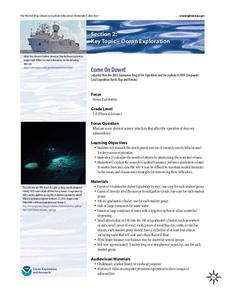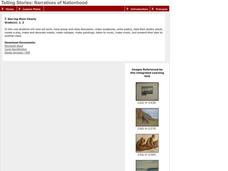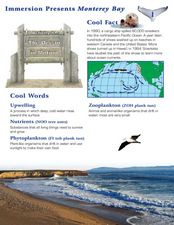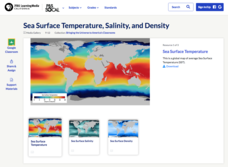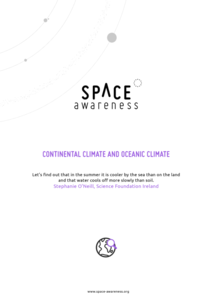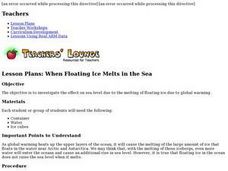NOAA
A Moving Crust
Young scientists piece together the geological puzzle that is the earth in the third and final instructional activity of this earth science series. With the help of numerous multimedia resources and a series of engaging hands-on...
NOAA
Methane Hydrates – What's the Big Deal?
Have you ever tried to light ice on fire? With methane hydrate, you can do exactly that. The ice forms with methane inside so it looks like ice, but is able to burn. The lesson uses group research and a hands-on activity to help scholars...
NOAA
Come on Down!
What do we do when a dive is too dangerous for humans to accomplish? Send in the robots! Middle school scientists get acquainted with several different models of submersible robots in the second instructional activity of six from NOAA....
Curated OER
The Water Planet
Students use NASA photographs and hands-on activities to compare the amounts of land and water on our planet. They discover that the world has five oceans and that they cover seventy percent of Earth's surface. Students learn how this...
Curated OER
Sea-ing More Clearly
Explore works of art with your class by engaging them in a variety of artistic activities including papier-mache sculpture, poetry, performance, and more. After viewing and discussing four paintings of the sea by Robert Harris, learners...
Curated OER
So Much Water, So Little to Drink
Students explore salt and fresh water. In this water lesson, students investigate the amount of Earth covered by water. Students compare the amounts of salt water to fresh water. Students create a visual representation to aid comprehension.
Curated OER
Monterey Bay
Young scholars read background information about Monterey Bay, California, and conduct related experiments. In this ocean in motion lesson, students read information about the location, wildlife, and characteristics of Monterey Bay. They...
NOAA
Into the Deep
Take young scientists into the depths of the world's ocean with the second lesson of this three-part earth science series. After first drawing pictures representing how they imagine the bottom of the ocean to appear, students investigate...
NOAA
An Ocean of Energy
Young biologists trace the path of the sun's energy through marine ecosystems in the second part of this four-lesson series. Building on prior knowledge about producers, consumers, and decomposers students are introduced to the concept...
NOAA
Calling All Explorers
Let's get moving! The second installment of a 2-part series of six adventures helps learners take part in individual explorations by sea and by land. After navigating the waters in an informative WebQuest, groups create and hide their...
NOAA
History's Thermometers
How is sea coral like a thermometer? Part three of a six-part series from NOAA describes how oceanographers can use coral growth to estimate water temperature over time. Life science pupils manipulate data to determine the age of corals...
NOAA
What Killed the Seeds?
Can a coral cure cancer? Take seventh and eighth grade science sleuths to the underwater drugstore for an investigation into emerging pharmaceutical research. The fifth installment in a series of six has classmates research the wealth of...
BrainPOP
Latitude and Longitude Differentiated Lesson Plan
Scholars warm-up their map skills with a discussion using location words to describe familiar places. An engaging video informs class members about latitude and longitude. Three leveled activities extend the learning experience for...
PBS
The Ocean and Climate: Heat Redistribution
Here on Earth, heat goes with the flow! Young climatologists dive in to the connection between ocean currents and heat distribution during a science lesson. Scholars work with interactive and print resources to create a thorough...
PBS
Sea Surface Temperature, Salinity, and Density
Earth's vast ocean is full of mysteries! Science scholars discover the big-picture properties that influence its characteristics at different latitudes using a lesson from PBS's Weather and Climate series. After completing a background...
PBS
Regional Patterns of Climate: Pacific Northwest
Climate systems involve sunlight, ocean, atmosphere, ice, land forms, and many other factors. Scholars explore each of these variables related to the Pacific Northwest rain forest. They use an online interactive to investigate the polar...
Space Awareness
Continental Climate and Oceanic Climate
There's nothing better than a cool breeze blowing in from the ocean. Scholars explore how water affects change in temperature using a hands-on experiment on climate. They use measurement tools to compare the continental and oceanic...
Nemours KidsHealth
Water Safety: Grades 9-12
Make a big splash with a instructional activity about water safety. After reading three articles related to water safety, high schoolers first choose one water safety rule to research and write a report summarizing their findings. They...
Curated OER
Law of the Sea/ Don't Rock the Boat
Students read Ronald Reagan's December 27, 1988 proclamation about US territorial waters. They discuss its contents to decipher exactly what it means and to complete a worksheet answering questions about the proclamation.
Curated OER
Come on In- the Water's Fine
Students examine how coastal erosion effects seaside communities. They investigate how people have to make choices when manipulate the physical environment such as when dredging and constructing seawalls in coastal areas. They complete a...
Curated OER
Planetary Web Of Life
Students watch a video about the death of a whale. They explore the possible reasons for a marine mammal's death and discuss the importance of its death to our own lives and survival.
Curated OER
When Floating Ice Melts in the Sea
With this simple inquiry exercise young scientists observe the effects of melting ice on water level. Set up an easy experiment with floating ice cubes in a dish of water then have your pupils make and record their observations of the...
Curated OER
Down in the Dumps
After an introduction to municipal sludge, middle school ecologists consider the pros and cons of dumping in the Hudson River Canyon. The class is split into two groups: one to debate in favor or dumping and one to debate against the...
Curated OER
Sea Liverpool
Students explore Liverpool England's maritime history and development as an important port from its early days to the present. Through hands-on activities and community based instruction, they simulate sailing experiences and life aboard...
Other popular searches
- Continents and Oceans
- Continents Oceans
- Oceans and Seas
- Oceans of the World
- 7 Continents and Oceans
- Oceans and Climate
- Lesson Plans on Oceans
- Salty Oceans
- Salinity in the Oceans
- Lessons on Oceans
- Extent of Oceans
- Oceans and Climate Change




